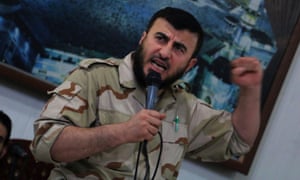Leader of powerful Syrian rebel group killed in airstrike,Jaysh Al-Islam
Zahran Alloush, head of Jaysh al-Islam, said to have died along with five other senior leaders after planes targeted powerful insurgent faction’s headquartersHis death was first reported by the Reuters news agency citing two rebel sources. The Syrian state news agency said Alloush was killed in the eastern Ghouta region, where Jaysh al-Islam holds sway. The Syrian Observatory for Human Rights (SOHR), a network with wide contacts inside Syria, said aircraft targeted a meeting of Jaysh al-Islam’s leadership in eastern Ghouta, killing Alloush and five other senior leaders.
If true, the death of Alloush, who is reportedly backed by Saudi Arabia and Turkey, will be a major blow to the opposition.
The fact that the airstrikes targeted a meeting of the group’s leadership represents an intelligence coup for the Syrian government and its foreign backer, Russia, which has led the reconnaissance and surveillance efforts since it intervened on behalf of Bashar al-Assad’s regime back in October. “The news has reached us, that is God’s will and we pray that God has mercy on him,” said a source in Jaysh al-Fateh, one of the strongest rebel coalitions in Syria, which includes fighters from Jabhat al-Nusra, the al-Qaida affiliate in the country.
One of the most controversial figures in the insurgency, Alloush rose to prominence as the leader of Jaysh al-Islam, which has maintained control over areas in the suburbs of Damascus despite years of siege by the Assad regime and relentless aerial campaigns on opposition-held areas. Eastern Ghouta was even subjected to chemical attacks when the government launched missiles laced with sarin in the area, killing over a thousand people – including many children.
Alloush’s early propaganda videos were overtly sectarian, urging the expulsion of Shias and Alawites from Damascus. Assad belongs to the Alawite minority, which is nominally part of Shia Islam, and who are considered heretics by Sunni extremists. He was also opposed to the Islamic State terror group, and lost many fighters in battles against the militants.
Since then, Alloush sought to temper his views to appear more palatable to potential western backers, retracting the demands for the expulsion of Alawites in a recent interview with McClatchy, calling them “part of the Syrian people”.
It was initially unclear whether Alloush was killed in a Russian or Syrian airstrike, but rebel sources indicated that the attack was Russian in origin. The Russian air force has launched over 5,000 raids since its intervention began.
The rebel sources said that Russian planes fired at least 10 missiles at a secret headquarters of the group, which is the largest rebel faction in the area and has about 15,000 to 20,000 fighters. One of the rebels said the group had chosen one of its top military commanders, Abu Hammam al Buwaidani, as its new head.
“Alloush’s martyrdom should be a turning point in the history of the revolution and rebel groups should realise they are facing a war of extermination and uprooting by Putin’s regime,” said Labib al Nahhas, a senior figure in the main Ahrar al-Sham group.
The Assad regime is seeking to expand its sphere of control in the vicinity of the capital, and has apparently reached an agreement with Isis militants in the Yarmouk refugee camp in southern Damascus, through which fighters will withdraw from the area they occupied earlier this year.
 Once home to hundreds of thousands of Syrians and Palestinians, Yarmouk
has been besieged for three years by the Assad government, causing a
major influx of refugees into neighbouring Lebanon in 2012. Isis took
advantage of a power vacuum earlier this year, collaborating with Jabhat
al-Nusra militants to take over most of the camp.
Once home to hundreds of thousands of Syrians and Palestinians, Yarmouk
has been besieged for three years by the Assad government, causing a
major influx of refugees into neighbouring Lebanon in 2012. Isis took
advantage of a power vacuum earlier this year, collaborating with Jabhat
al-Nusra militants to take over most of the camp.Al-Manar, the TV station of Hezbollah, the Lebanese military and political organisation that is fighting alongside the Assad government, said preparations had begun yesterday for the militants’ withdrawal. It said they would leave on buses to Raqqa, the capital of Isis’s self-proclaimed caliphate, and the Aleppo countryside – both locations where the opposition is fighting Isis and has seized large swathes of territory from them.
The timing of the withdrawal, coming as the opposition places Isis under increasing pressure in northern Syria, raises questions about the government’s broader strategy of weakening rebel groups – even those fighting Isis – in an effort to present itself as the only palatable alternative on the Syrian battlefield.
The SOHR said the government had agreed to the plan, brokered by the UN, which would see families of militants, wounded militants and civilians leave before Isis fighters depart the long-embattled neighbourhood.
It was the latest in a series of attempts to broker local ceasefires in an effort to bring about a nationwide halt to the fighting. Earlier this month, fighters in al-Waer, a district in Homs that was held by the opposition, evacuated the area in a ceasefire agreement that brought much needed humanitarian aid.
In a separate development, Russia and Qatar’s foreign ministers said they would work to encourage talks between the opposition and the government. Negotiations are set to be held in Vienna in January in the latest effort to bring an end to the war, which has killed over a quarter of a million people.
No comments:
Post a Comment